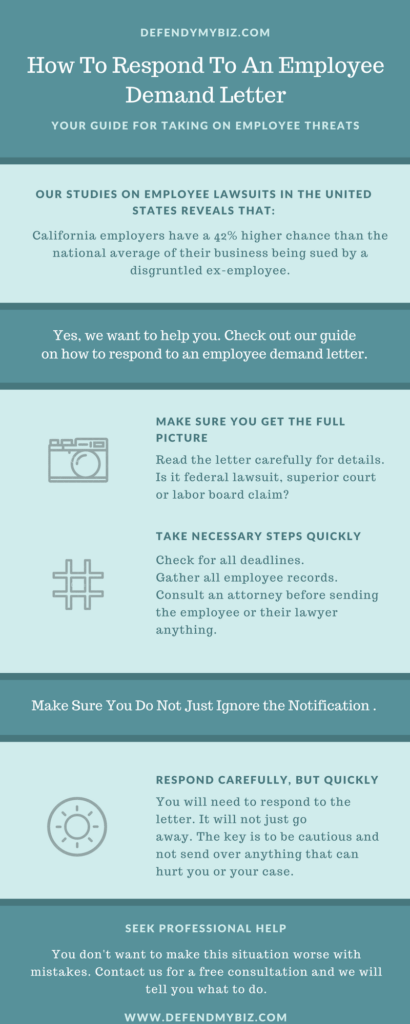
Posted on November 6th, 2016
So you have been working really hard and building your business and things are going good. As you expand, you have added employees and your business and profit continue to grow.
Well I don’t want freak you out to much or be the bearer of bad news but when your business is doing good and its starting to grow this is the time you need to really pay attention to California Labor Laws and any issues with employees.
That is because the better your business does and the more employees you hire the bigger the target on your back becomes. What target is that? Its a target that is being placed on you by angry ex-employees and greedy employee side lawyers looking to make a quick buck.
These lawyers will search out business like yours trying to find some weakness or crack in your policies or actions that they can take advantage of.
I have some more bad news for you. As an Employer, State laws are one sided and stacked against you. Employees know this. Their greedy attorneys know this. And if they can they will come after you to exploit it.
One of the most common ways you will first become aware of an issue like this is when you receive a threatening letter from an attorney representing an ex-employee.
This is called a employee demand letter and is sometimes the first indication you will get that there was even a problem with this ex employee. Sometimes these claims can seem ridiculous or baseless but unfortunately they cannot be ignored.
These letters are typically aggressive, demanding and meant to scare you. It could be referencing any area of employment law; there are sexual harassment demand letters, discrimination demand letters, retaliation demand letters etc…
How you first respond to one of these letters could have serious consequences on the outcome of the matter and that is why I wanted to give you some tips.
If you receive a letter from a former employees attorney or some other form of contact, there are a few things that you should and should not do.
What to Do First
1.) The first thing that you should do is to review the document thoroughly to see what form the complaint is in.
a)Is it a federal lawsuit,
b) is it a superior court suit,
c) is it a labor board claim or
d) is it a workers comp filing.
Take note of which of the above categories this falls under. Depending on which the case, the cost and the preparation could be very different.
2.) You should look at the directions, what you have been asked to do next and know any deadlines.
You dont need to panic from one of these demand letters. But you need to take them seriously. A very important thing to note are deadlines. If you miss deadlines that could come back to bite you. So you want to take action right away and you want to take note of all deadlines.
3.) You should gathered all the records and information related to that employee organize it and put it together, ready to be reviewed by an attorney on your side.
You want to make sure that you have all the documented information of the past history with this employee. That includes, reviews, emails, write up etc.. Do not just try to rely on faulty memory.
4.) You should consult an attorney and discuss the situation, the facts and what should be done next.
Look I know its in my best interest to say you need to “contact an attorney”, after all that’s what I do, but it really is true. An attorney who only protects California employers sees this every day and will know pretty quickly what to do with this letter.
As I said earlier you want to make sure you don’t make any mistakes early on that are going to cost you later. Even if you decide not to hire an attorney for this case it will be worth it to pay $300-$400 dollars for a one hour consultation and get a professionals review of the matter.
Any good attorney, who has years of experience representing employers, and an opportunity of a proper review of everything, can tell you how best to proceed after the one hour consultation.
Heck I offer a FREE 15 Minute Consultation to any California employer and I could at least tell you what the situation is and what to do next in that amount of time. So you have nothing to lose.
What you should not do!
1.) Do not just ignore the letter and hope it goes away. Even if the claims in the letter seem crazy to you they are not just going to go away on their own. You will need to have a response.
2.) Do not just send the employees attorney everything they asked for in the letter. You may think to yourself that you did nothing wrong, have nothing to hide, so why not send them everything they ask for?
Well the reason you do not want to do this is because sometimes they are just fishing for more to hold against you.
California labor laws are so complicated and change so frequently almost no business has a 100% perfect employee policies.
So what these unscrupulous lawyers will do is to demand your polices and other records and then pour over them to try to find mistakes they can sue you on.
Disgusting? Yes. But legal? Yes.
Most Common Employee Claims
Here are some of the categories for most common official complaints we see filed against California employers.
Info on California Employee Lawsuits
California claims against employers are completely out of control and just seem to get worse and worse with each passing year. It really has become one of the biggest threats to modern business in California.
According to the graph below our state is 4th most likely out of 50 states for you to get sued as an Employer. (2015 stats)
The percentage below shows what the chance of being sued for an employee matter above the national average.
- New Mexico 66%
- Nevada 47%
- Alabama 41%
- California 40%
I was actually shocked to see that there were 3 states ahead of us! Working as lawyer who only defends California employers for so many years I always thought we were #1 by far.
Still pretty crazy though. There is a 12% chance nationally you will be involved in an employee lawsuit as a business owner and if you are in California the chances are 40% higher!
Believe me I see these lawsuits every day and they are just getting more and more frequent in our state. And this looks like its only going to get worse in the near future.
If you receive one of these demand letters from a threatening attorney, do not panic!
Remember I offer a FREE 15 Minute Consultation to any California employer. You can tell me what is in the letter and I can give you a good outline of what to expect. Even if you do not hire me you will still have the best advice on what you should do next for free so you have nothing to lose.
.
Make sure you protect yourself and if you get a demand letter from an ex-employee follow the tips in this post.

Book a FREE 15 Minute Consultation with me today so I can listen to your story and tell you exactly what you need to do to get rid of your employee problems.
Bonus Free Infograph for You!
Here is a quick infograph on ‘How to Respond to an Employee Demand Letter” (click to enlarge)
Want to share this image on your site? Just copy and paste the embed code below:
Download My Free Ebook: ‘6 Tips To Protect Your California Business From an Employee Lawsuit’



